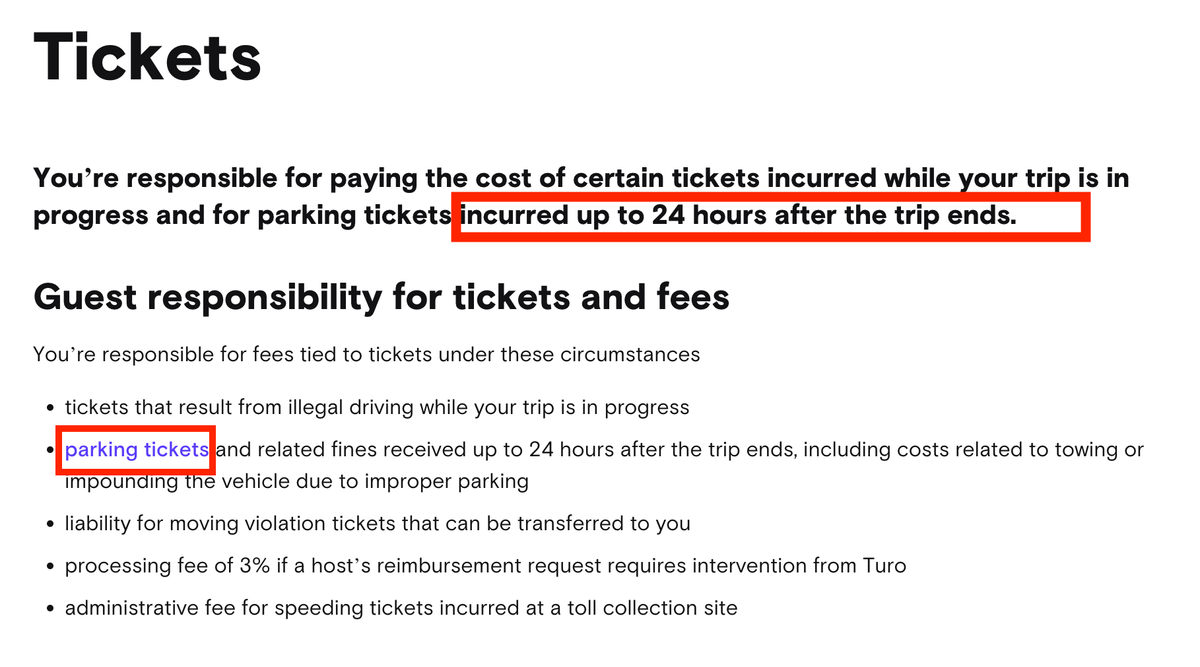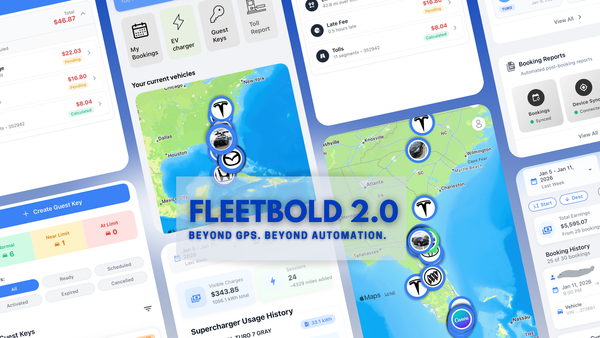Who is REALLY Responsible for Traffic Tickets in a Rental?
This blog covers who is responsible for paying traffic tickets in rental cars, explaining when the customer is responsible and when the vehicle owner must step

Introduction
As a car rental business owner, you may occasionally face situations where your vehicles are issued traffic tickets. While some of these situations may be straightforward, others can be confusing, especially when the violation involves a renter. One of the most common questions that car rental businesses face is: who is responsible for paying traffic tickets when a rental vehicle gets a ticket during the rental period?
The answer to this question is not always simple, as it can vary depending on the type of violation, the circumstances under which the violation occurs, and the terms of your rental agreement. In this blog, we will break down the two primary situations:
- When the customer is responsible: This applies to situations where the renter is directly identifiable as the violator, such as police stops or moving violations.
- When the customer is not directly identified: This includes situations like parking tickets, school bus violations, and automated traffic camera violations where the driver is not immediately identified.
Understanding these scenarios will help you as a host or rental business owner to navigate your responsibilities and avoid unexpected fees. It will also help you manage your relationships with customers more effectively.
Part 1: When the Customer is Responsible for the Traffic Ticket
1.1 Police Stops and Moving Violations
One of the most common types of traffic violations that lead to tickets is when a driver is pulled over by the police. Whether it's for speeding, running a red light, or other moving violations, these tickets are directly tied to the driver.
How It Works
- Issuance of the Ticket: When a police officer pulls over a driver for a traffic violation, they will issue the ticket to the driver directly. If the renter is behind the wheel at the time of the violation, the ticket is issued to them, and they are responsible for the fine.
- Ticket Sent to Vehicle Owner: In many cases, the ticket will be sent to the vehicle’s registered owner, which is typically the rental business or host, even though they were not the driver.
- Who Pays the Fine: The vehicle owner, in this case, the host or rental business, is responsible for paying the fine if the renter hasn’t already paid it. Most car rental companies and hosts will then charge the renter for the ticket through the platform or the rental agreement, along with any administrative fees for processing the fine.
Charge Process
- Directly Charge the Renter: As a host, once you receive the ticket, you can initiate the charge process. Using your platform’s built in payment system, you can directly charge the renter for the fine. If you manage your rentals through a specific rental business, ensure that you have a policy for charging guests for any fines incurred during their rental period.
- Administrative Fees: Often, you may charge an additional administrative fee for handling the ticket. This fee can cover the time and effort required to process the fine, send notifications to the renter, and submit the payment.
1.2 Red Light Cameras and Other Moving Violations
In many cities across the country, traffic violations such as running a red light or speeding are caught by automated cameras. These cameras take photographs of the vehicle’s license plate and automatically issue a ticket to the registered owner.
How It Works
- Ticket Issued to Vehicle Owner: Since the violation is captured by the camera, the ticket will usually be sent to the vehicle's registered owner, which in this case is the rental business or the host.
- Who Pays the Fine: Even if the vehicle owner (you, as the host) wasn’t driving, you are still responsible for paying the fine unless the renter is held accountable for it. If the renter was driving at the time of the violation, you can charge them for the fine through the platform.
Renter’s Responsibility
- Clear Identification of Renter: In cases where a violation is captured by red light or speed cameras, it’s important that you can clearly identify the renter as the driver at the time the violation occurred. This is typically straightforward if the violation occurred during the rental period and the renter is identifiable as the one using the vehicle.
- Legal Process and Disputes: In some cases, renters may dispute the ticket or claim that they weren’t the driver. You’ll need to handle this situation carefully and ensure that you have the proper documentation to prove that the renter was responsible for the violation.
Part 2: When the Customer is NOT Identified (Parking Tickets, School Buses, and More)
2.1 Parking Tickets
Parking tickets are a common issue in the rental car business. These violations can occur when a renter parks the vehicle in a restricted area or fails to pay for parking. In these cases, the following applies:
How It Works
- Issued to Vehicle Owner: Parking tickets are tied to the vehicle itself, not the driver. So, the ticket will be issued to the vehicle’s registered owner, which is the host or the rental company.
- Transferring Responsibility: While the ticket is sent to the owner, it is ultimately the renter’s responsibility to pay. If the host receives the ticket after the rental period ends, they can charge the renter for the fine via the platform, as long as the rental agreement specifies that the renter is responsible for parking violations.
Preventing Parking Violations
- Communication is Key: To avoid parking violations, it is critical to communicate your expectations clearly with your renters. Provide guidelines about where they can and cannot park and recommend parking garages or areas that won’t result in fines.
- Pre Rental Education: Educating your customers before the rental period begins can reduce the likelihood of parking violations.
2.2 School Bus Violations
In many regions, laws are particularly strict regarding school buses, especially when they stop to let children on or off. Violating these laws, such as passing a stopped school bus, is a serious offense.
How It Works
- Ticket Assigned to Vehicle: Similar to parking tickets, these violations are often recorded by cameras attached to the school bus. The violation is then sent to the vehicle's registered owner. If the rental car was involved, the ticket is sent to you, the host.
- Host's Responsibility: Although the ticket is sent to the vehicle owner, the renter is typically responsible for the fine. If the car was rented out during the violation, you can charge the renter for the ticket using the platform.
How to Handle
- Verify the Rental Period: Check the rental period to ensure that the violation occurred while the renter had the vehicle. If so, charge the renter for the fine using the platform.
- Clear Documentation: It’s important to keep a copy of the ticket, communicate with the renter about their responsibility, and document any conversations or disputes about the ticket.
How to Avoid the “Ineligible Accident Charge” Email
One of the most frustrating scenarios for hosts is receiving a message from Turo that says INELIGIBLE ACCIDENT CHARGE after submitting a claim. This usually happens when the submission is missing key information. To avoid this, always include these three items:
- Proof of payment – A clear receipt that shows the charge.
- Ticket with data – The ticket must show the time and vehicle identification.
- License plate – This is required to match the violation to your vehicle.
If any of these are missing, your claim will be denied automatically.
If you submit everything and still receive the ineligible email, call support right away. They are required to tell you why the claim was rejected. A very common reason is that the incidental charge was submitted under the wrong category. Double-check this detail before submitting, as using the correct category saves time and prevents unnecessary rejections.
How to Manage Traffic Tickets as a Car Rental Business
Properly managing traffic tickets and fines is crucial for ensuring your rental business runs smoothly. Here are a few tips to help you handle fines efficiently:
1. Set Clear Expectations with Renters
- Clear Communication: When renting your vehicle, always include clear guidelines about the renter’s responsibility for any fines or tickets incurred during the rental period.
- Policies in the Rental Agreement: Make sure that the rental agreement explicitly outlines the renter’s responsibility for any fines incurred during the rental period, including parking tickets, red light violations, and moving violations.
2. Charge the Renter for Additional Fees
- Use the Platform: If a ticket is issued, you can charge the renter directly through your platform. Make sure to upload all relevant documentation to make the process smooth.
3. Keep Accurate Records
- Documentation: Always keep detailed records of any fines, including photos of the ticket, communication with the renter, and any steps taken to resolve the issue. This will help you handle disputes and keep track of responsibilities.
Conclusion: Who’s REALLY Responsible for Traffic Tickets in a Rental?
Understanding who is responsible for traffic tickets in a rental car is essential for managing your rental business effectively. In most cases, the renter is responsible for paying any fines or tickets incurred during their rental period, especially if they were driving the vehicle at the time of the violation. However, it’s important to make sure you can identify the renter and have all the necessary documentation to transfer responsibility.
By clearly communicating policies to your renters, keeping accurate records, using the correct claim category, and always including proof of payment, ticket data, and license plate, you can avoid the dreaded ineligible accident charge email and protect your rental business from unnecessary costs.
Frequently Asked Questions (FAQ)
1. How do I charge a guest for a parking ticket?
Log into your platform, locate the relevant reservation, and use the "Charge Additional Expenses" feature to add the parking ticket to the guest’s account.
2. How long do I have to charge a guest for a traffic ticket?
You have up to 90 days after the trip ends to charge a guest for parking tickets and moving violations.
3. What happens if the renter disputes the ticket?
If a guest disputes the charge, provide clear evidence such as a copy of the ticket, vehicle registration details, and rental agreement. Support can assist with mediation if needed.
4. Can the renter be responsible for a red light camera ticket?
Yes, if the renter was driving at the time of the violation, they are responsible for the ticket, but the fine may be addressed to the host first. The host can then transfer responsibility.
5. What should I do if I receive a ticket after the rental period?
You should contact support within 90 days and upload any necessary documentation to charge the renter. If the ticket arrives later, you may need to contact support for assistance.
6. What are the most common reasons a claim gets rejected?
The biggest issues are missing proof of payment, missing license plate, or the wrong claim category. Always check these three before submitting.
7. Can I add administrative fees on top of the fine?
Yes, many hosts do. Just make sure it’s clearly stated in your rental agreement and supported by platform policy.
8. Do toll violations follow the same process as tickets?
Yes, tolls are billed to the vehicle owner. You can charge renters for tolls incurred during their trip, but keep receipts and timestamps.
9. How quickly do I need to upload photos for an incident?
Photos must be uploaded within 24 hours of the trip end. Missing this deadline is one of the fastest ways to lose a claim.
10. What if the platform says my claim is ineligible but I did everything right?
Call support immediately. Ask them to review the metadata of your ticket and receipts. Sometimes the system rejects claims incorrectly, and human review can overturn it.
11. Can unpaid tickets hurt my business?
Yes, unpaid tickets can lead to registration holds, collections, or higher insurance premiums. Always resolve them quickly, then recover costs from the renter afterward.
12. What’s the best way to prevent disputes with renters over tickets?
Clear communication before and during the trip. Provide reminders about parking rules, toll roads, and local regulations. Most renters appreciate the guidance and will avoid trouble.
As a car rental business owner, you may occasionally face situations where your vehicles are issued traffic tickets. While some of these situations may be straightforward, others can be confusing, especially when the violation involves a renter. One of the most common questions that car rental businesses face is: who is responsible for paying traffic tickets when a rental vehicle gets a ticket during the rental period?
The answer to this question is not always simple, as it can vary depending on the type of violation, the circumstances under which the violation occurs, and the terms of your rental agreement. In this blog, we will break down the two primary situations:
- When the customer is responsible: This applies to situations where the renter is directly identifiable as the violator, such as police stops or moving violations.
- When the customer is not directly identified: This includes situations like parking tickets, school bus violations, and automated traffic camera violations where the driver is not immediately identified.
Understanding these scenarios will help you as a host or rental business owner to navigate your responsibilities and avoid unexpected fees. It will also help you manage your relationships with customers more effectively.
Part 1: When the Customer is Responsible for the Traffic Ticket
1.1 Police Stops and Moving Violations
One of the most common types of traffic violations that lead to tickets is when a driver is pulled over by the police. Whether it's for speeding, running a red light, or other moving violations, these tickets are directly tied to the driver. In this section, we will explore in more detail how these situations unfold.
How It Works
- Issuance of the Ticket: When a police officer pulls over a driver for a traffic violation, they will issue the ticket to the driver directly. If the renter is behind the wheel at the time of the violation, the ticket is issued to them, and they are responsible for the fine.
- Ticket Sent to Vehicle Owner: In many cases, the ticket will be sent to the vehicle’s registered owner, which is typically the rental business or host, even though they were not the driver.
- Who Pays the Fine: The vehicle owner, in this case, the host or rental business, is responsible for paying the fine if the renter hasn’t already paid it. Most car rental companies and hosts will then charge the renter for the ticket through the platform or the rental agreement, along with any administrative fees for processing the fine.
Charge Process
- Directly Charge the Renter: As a host, once you receive the ticket, you can initiate the charge process. Using your platform’s built in payment system, you can directly charge the renter for the fine. If you manage your rentals through a specific rental business, ensure that you have a policy for charging guests for any fines incurred during their rental period.
- Administrative Fees: Often, you may charge an additional administrative fee for handling the ticket. This fee can cover the time and effort required to process the fine, send notifications to the renter, and submit the payment.
1.2 Red Light Cameras and Other Moving Violations
In many cities across the country, traffic violations such as running a red light or speeding are caught by automated cameras. These cameras take photographs of the vehicle’s license plate and automatically issue a ticket to the registered owner.
How It Works
- Ticket Issued to Vehicle Owner: Since the violation is captured by the camera, the ticket will usually be sent to the vehicle's registered owner, which in this case is the rental business or the host.
- Who Pays the Fine: Even if the vehicle owner (you, as the host) wasn’t driving, you are still responsible for paying the fine unless the renter is held accountable for it. If the renter was driving at the time of the violation, you can charge them for the fine through the platform.
Renter’s Responsibility
- Clear Identification of Renter: In cases where a violation is captured by red light or speed cameras, it’s important that you can clearly identify the renter as the driver at the time the violation occurred. This is typically straightforward if the violation occurred during the rental period and the renter is identifiable as the one using the vehicle.
- Legal Process and Disputes: In some cases, renters may dispute the ticket or claim that they weren’t the driver. You’ll need to handle this situation carefully and ensure that you have the proper documentation to prove that the renter was responsible for the violation.
Part 2: When the Customer is NOT Identified (Parking Tickets, School Buses, and More)
Not all tickets are issued when the driver is identifiable. In many cases, the violation may not be directly tied to the person behind the wheel. Here are some common examples:
2.1 Parking Tickets
Parking tickets are a common issue in the rental car business. These violations can occur when a renter parks the vehicle in a restricted area or fails to pay for parking. In these cases, the following applies:
How It Works
- Issued to Vehicle Owner: Parking tickets are tied to the vehicle itself, not the driver. So, the ticket will be issued to the vehicle’s registered owner, which is the host or the rental company.
- Transferring Responsibility: While the ticket is sent to the owner, it is ultimately the renter’s responsibility to pay. If the host receives the ticket after the rental period ends, they can charge the renter for the fine via the platform, as long as the rental agreement specifies that the renter is responsible for parking violations.
Preventing Parking Violations
- Communication is Key: To avoid parking violations, it is critical to communicate your expectations clearly with your renters. Provide guidelines about where they can and cannot park and recommend parking garages or areas that won’t result in fines.
- Pre Rental Education: Educating your customers before the rental period begins can reduce the likelihood of parking violations.
2.2 School Bus Violations
In many regions, laws are particularly strict regarding school buses, especially when they stop to let children on or off. Violating these laws, such as passing a stopped school bus, is a serious offense.
How It Works
- Ticket Assigned to Vehicle: Similar to parking tickets, these violations are often recorded by cameras attached to the school bus. The violation is then sent to the vehicle's registered owner. If the rental car was involved, the ticket is sent to you, the host.
- Host's Responsibility: Although the ticket is sent to the vehicle owner, the renter is typically responsible for the fine. If the car was rented out during the violation, you can charge the renter for the ticket using the platform.
How to Handle
- Verify the Rental Period: Check the rental period to ensure that the violation occurred while the renter had the vehicle. If so, charge the renter for the fine using the platform.
- Clear Documentation: It’s important to keep a copy of the ticket, communicate with the renter about their responsibility, and document any conversations or disputes about the ticket.
How to Manage Traffic Tickets as a Car Rental Business
Properly managing traffic tickets and fines is crucial for ensuring your rental business runs smoothly. Here are a few tips to help you handle fines efficiently:
1. Set Clear Expectations with Renters
- Clear Communication: When renting your vehicle, always include clear guidelines about the renter’s responsibility for any fines or tickets incurred during the rental period.
- Policies in the Rental Agreement: Make sure that the rental agreement explicitly outlines the renter’s responsibility for any fines incurred during the rental period, including parking tickets, red light violations, and moving violations.
2. Charge the Renter for Additional Fees
- Use the Platform: If a ticket is issued, you can charge the renter directly through your platform. Make sure to upload all relevant documentation to make the process smooth.
3. Keep Accurate Records
- Documentation: Always keep detailed records of any fines, including photos of the ticket, communication with the renter, and any steps taken to resolve the issue. This will help you handle disputes and keep track of responsibilities.
Conclusion: Who’s REALLY Responsible for Traffic Tickets in a Rental?
Understanding who is responsible for traffic tickets in a rental car is essential for managing your rental business effectively. In most cases, the renter is responsible for paying any fines or tickets incurred during their rental period, especially if they were driving the vehicle at the time of the violation. However, it’s important to make sure you can identify the renter and have all the necessary documentation to transfer responsibility.
By clearly communicating policies to your renters, keeping accurate records, and using your platform to charge them for fines, you can ensure that your business is not burdened by the costs of violations that were not your fault.
Frequently Asked Questions (FAQ)
1. How do I charge a guest for a parking ticket?
Log into your platform, locate the relevant reservation, and use the "Charge Additional Expenses" feature to add the parking ticket to the guest’s account.
2. How long do I have to charge a guest for a traffic ticket?
You have up to 90 days after the trip ends to charge a guest for parking tickets and moving violations.
3. What happens if the renter disputes the ticket?
If a guest disputes the charge, provide clear evidence such as a copy of the ticket, vehicle registration details, and rental agreement. Support can assist with mediation if needed.
4. Can the renter be responsible for a red light camera ticket?
Yes, if the renter was driving at the time of the violation, they are responsible for the ticket, but the fine may be addressed to the host first. The host can then transfer responsibility.
5. What should I do if I receive a ticket after the rental period?
You should contact support within 90 days and upload any necessary documentation to charge the renter. If the ticket arrives later, you may need to contact support for assistance.






